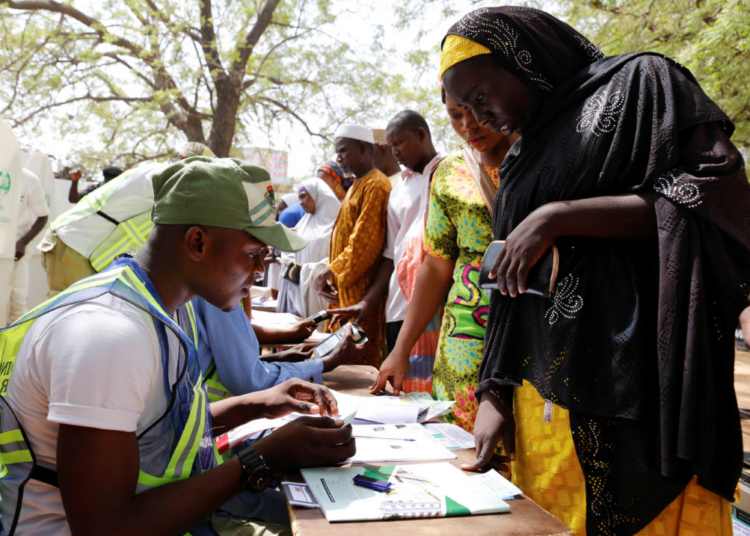Democracy is a process that is based on the vote of the citizen! Therefore, the setback of the 25th should not deter citizens from coming out to vote on Saturday March 11, 2023.
In fact, that INEC failure should ginger Nigerians to go out enmasse to cast their ballot. Whatever happened on the 25th is already in court and would be remedied if the Supreme Court finds merit in the plea of the candidates who say the election was rigged.
True, the evidence seems to suggest such tampering but that should not be allowed to affect the zeal of Nigerians for choosing leaders of their own choice. Indeed, INEC clearly didn’t follow the stipulations of the electoral act but methinks they will do so in the election of the 11th knowing fully well the mood of Nigerians.
As I was putting pen to paper for this column, I stumbled on the interview that the Chairman of the Independent National Electoral Commission (INEC) Prof Mahmood Yakubu granted BBC on the electoral body’s preparedness for the 2023 general election.
In that interview, the BBC had said to Yakubu, “Major candidates in the elections are already complaining that INEC had no capacity to transmit the results electronically to the national database?”
Yakubu responded thus, “Well, we did the pilot in August 2020, at Nasarawa State in central Nigeria, when we conducted a by-election in a state constituency. And since then, we piloted the transmission of results in 105 constituencies nationwide, including major governorship elections. We did it in Anambra, we did it in Ekiti and Osun, we also did it in the Federal Capital Territory. Now some of them may be small elections in the Nigerian context. But the state with the least number of registered voters in places where we transmitted election results is Ekiti. But Ekiti has more registered voters than The Gambia and Cape Verde put together. So, we are happy with the pilot that we have conducted and we are reasonably confident in the strength of the processes.”
“Even in rural areas?” the BBC asked. “The machine on election day doesn’t rely on internet to accredit voters. It works offline. Now when it comes to transmission of results that is where it needs network. But if there is no network in the immediate vicinity, the scanned image of the polling unit level results, which is taken using the BVAS (Bimodal Voter Accreditation System), will be transmitted as soon as the staff move from the polling unit to the collation centres. And we have been working with the major telecom companies in Nigeria and we are satisfied that the number of blind spots can be addressed in the country. And the number of blind spots where you have no network is really small,” Yakubu said.
By now most Nigerians know that Yakubu promised so much and delivered so little. His management of the election was far below anything this country has ever seen since 1999. Not only did the INEC fail to transmit results from polling units to its server in real time, several days after the presidential and National Assembly elections results are still being uploaded to the server. All over the country the BVAS failed to transmit the presidential election results but the same BVAS could transmit the National Assembly results which raised questions on why the presidential election results could not be transmitted and no coherent explanation had been given for this apparent deliberate absurdity. Add these to the haste in the declaration of president-elect by the INEC chairman without taking into consideration Section 134, sub-section 2(b) of the 1999 Constitution as amended which requires that for any presidential candidate to be declared president-elect he must have 25 percent of votes cast in the Federal Capital Territory (FCT) Abuja.
Section 134, subsection 2b states, “(2) A candidate for an election to the office of President shall be deemed to have been duly elected where, there being more than two candidates for the election-(a) he has the highest number of votes cast at the election; and (b) he has not less than one-quarter of the votes cast at the election each of at least two-thirds of all the States in the Federation and the Federal Capital Territory, Abuja.”
Many Nigerians felt letdown by the shoddy INEC conduct of the Feb 25th elections after so much was invested! Many are discouraged and are seemingly not willing to come out to vote on Saturday for the election of state governors and state assembly men.
I have seen this disillusionment on social media, I have seen it up personal on the streets so much so that I think it is an issue that must be addressed. Something must be done to bolster the confidence of Nigerians lest they ignore the elections of the 11th!
In one of his public statements, the INEC chairman Mahmood Yakubu promised that BVAS would be used for the gubernatorial and state assembly elections and that there will be electronic transmission of the results. This position apparently provoked the presidential candidate of Peoples Democratic Party (PDP), Atiku Abubakar, who said the assurances of a credible state election by the chairman of the Independent National Electoral Commission (INEC), Prof Mahmood Yakubu, are worthless and unconvincing.
Atiku stated this while responding to Yakubu’s promise to deliver credible governorship elections by barring staff who had compromised the presidential elections from participating in the March 11 governorship poll.
Yakubu, had in a meeting with Resident Electoral Commissioners promised to ensure the strict use of the Bimodal Voter Accreditation System (BVAS).
“All staff found to be negligent, whether they are regular or ad hoc officials, including collation and returning officers, must not be involved in the forthcoming elections. RECs must also immediately initiate disciplinary action where prima facie evidence of wrongdoing has been established,” the INEC boss stated.
Reacting in a statement by his special assistant on public communication, Mr Phrank Shaibu, Atiku described Yakubu’s assurances as “worthless and unconvincing.” He added that the INEC chairman was only trying to save face after conducting the worst elections Nigeria had ever witnessed since independence. He asked Yakubu not to try to deceive Nigerians again after the shambolic performance of INEC in the 25 February poll.
While the INEC should be called out for the mismanagement of the presidential and National Assembly elections, it is also wrong for Atiku to dismiss Yakubu’s promise to get it right this time around!
This attitude of Atiku could discourage the public from really coming out to exercise their franchise.
Already the outcome of the presidential election is being challenged in tribunal, so, it is now left for the judiciary!
However, the state governorship and House of Assembly elections should not be left to chance. After all the governors and state lawmakers are closer to the grassroot than the presidency and thus should deserve more attention of the voting public, especially that of the youths.
The February 25 elections, despite apparent flaws, produced many young Nigerians as lawmakers including a commercial motorcyclist popularly known as ‘Okada’ who was elected a member of the House of Representatives. Gradually and surely power devolves from the old brigade to the new brigade. This cannot happen fast enough if the youths become apolitical!
INEC may have failed Nigerian youths on February 25, 2023, but the youth would do more harm to their quest for a new Nigeria if they did not come out to vote for those governors and lawmakers that will make the difference in their various states.
If citizens do not come out to vote, those that may get elected may be the ones they don’t want in office. And one axiom states: “Bad leaders are elected by citizens who don’t vote!”
Let’s do the right thing by going out to vote on Saturday! This is not time for ‘siddon look.’
MAY NIGERIA REBOUND





